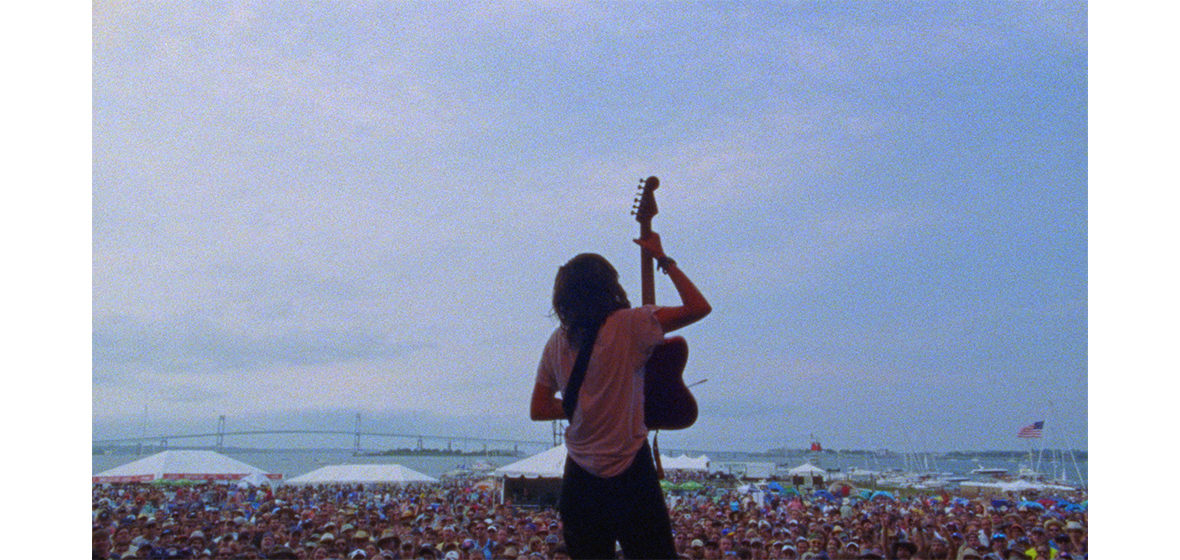Rating: ***
It’s unfair to compare every new musical documentary to old genre trailblazers, but it’s hard to separate the style from the influence. For all the documentaries about artists dealing with their fame and expectation on their work, we only have to look at D.A. Pennebaker’s Don’t Look Back about the infamous Bob Dylan tour when he tried to go electric, and someone in the crowd shouted, “Judas”. It’s a compelling piece of work because it doesn’t make it about Dylan per se, but instead uses him as a conduit to explore the artist’s weight in his audience, and the strenuous, sometimes self-hating process of letting your work go. It’s perfect; what it says about the thankless nature of a creative spirit and the role of a creator tangled between artistic drive and, yes, narcissism.
What is new for an artist to say after this? Because I will never compare Courtney Barnett to Bob Dylan, yet I couldn’t help shaking Pennebaker’s documentary from the back of my head. What is Anonymous Club trying to tell me that wasn’t tackled before?
For the uninitiated, Courtney Barnett is a Melbourne-based singer-songwriter who skyrocketed through international fame with her album, Sometimes I Sit and Think, and Sometimes I Just Sit. She’s like a millennial troubadour for the depressed crowd with a rather pleasant blend of pop, indie and anti-folk. Like Kimya Dawson, Jeffrey Lewis, Kurt Vile, and even Bob Dylan. Her quirky lyrics, delivered in a deadpan manner, speak truth to a generation dealing with panic attacks and unreasonable expectations. “Put me on a pedestal, and I’ll only disappoint you”, she shouts in her breakout single “Pedestrian at best”. It’s not poetry, it’s a statement of fact.
The idea for Anonymous Club came when Barnett’s filmmaker friend Danny Cohen asked her to record her thoughts while on tour for her sophomore record, Tell Me How You Really Feel – by all accounts, angrier and grungier than her folksy debut. The recording frames the narrative intercutting with disconnected moments of Barnett on the road as she mulls over success, depression and her struggles to have her audience understand the message she’s trying to convey. We have Barnett in concert, interacting with her band, alone in her room writing. In a strange cut, the whole band is glued to the TV watching some sporting event except for Barnett, in the back, gloomily lost in her thoughts. It’s a horrible cutaway from the narcissist page of the artist as the enlightened soul who doesn’t partake in mundane acts like mindless sports-watching. Doubt that was Cohen’s purpose, but it comes across as unintentionally cringing in its adulation for a person. Would Dylan have done the same? The man who said no one goes to a museum to see art for any other reason but entertainment would never. Would Pennebaker add it to his film? I doubt it.
Herein lies Anonymous Club‘s biggest sin. It fails to see it’s not for fans to understand Barnett’s words, but for Barnett to accept their interpretation. The film feels like a declaration of intent from an artist without exploring the other side. Remind me of how Fernando Pessoa, the prolific Portuguese poet who often signed his work with different heteronyms, said that three people read and interpreted his poems – him at the time of writing, him after writing, and the anonymous. Anonymous Club doesn’t see the latter. Right at the start, there’s a significant bit where Barnett meets a fan in Shanghai who asks her to sign his t-shirt and include his favourite lyrics. But Barnett doesn’t remember the whole line, which the fan promptly tells her, “I’d rather stay in bed / with the rain over my head / than have to pick my brain up off the floor”.
I want to know more about these guys who resonated on a whole new level that Barnett, as an artist, can’t comprehend. And see how she reacts to that while keeping her artistic integrity. For the most part, we don’t see her fans but for cutaways of them enjoying her concert in an orgasmic frenzy, as if Barnett was a Godsend, but honestly, she’s so much better than that.
In a way, Anonymous Club has the right intention. Cohen shoots everything with an old 16mm camera, saturated to oblivion, that gives the film an earnest touch only present in home videos. It plays like a slice of the life of an influential Australian artist, but it doesn’t go far enough to highlight her work beyond “it’s inspirational”. If you’re a fan of Courtney Barnett, you will love this. If you’re not, there’s nothing for you to see. If you don’t know her, it’s a curious introduction that will probably charm you. Either way, it won’t tell you a bigger truth. For that, you’ll have to put on her records.




